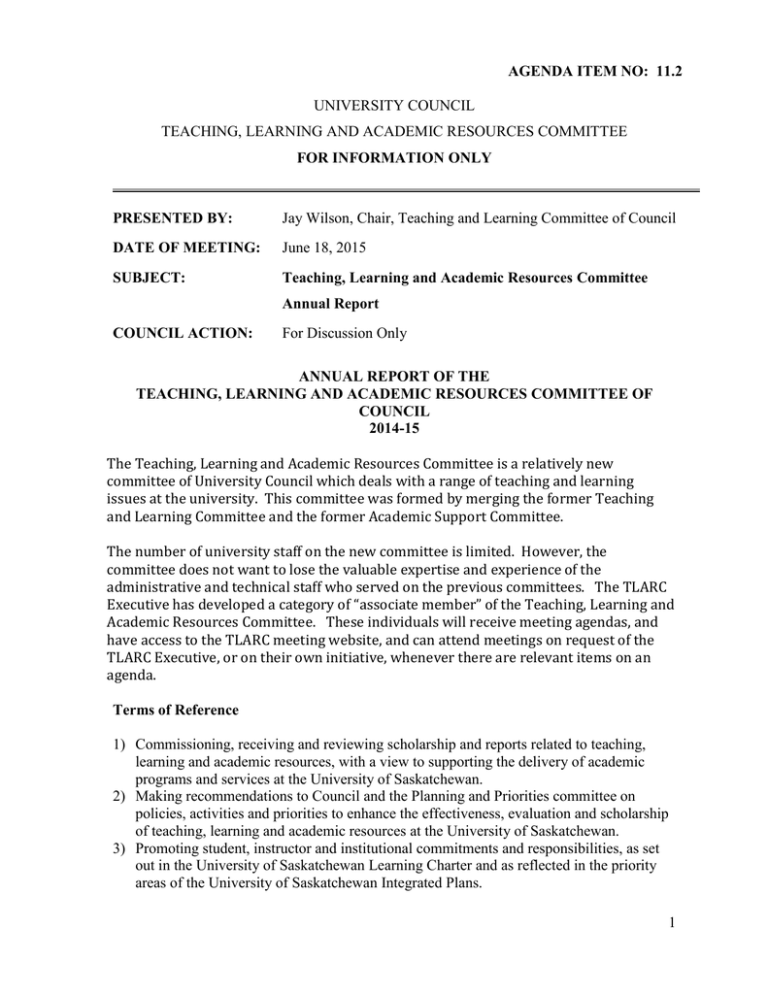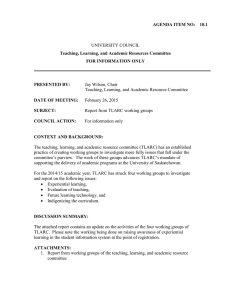UNIVERSITY COUNCIL TEACHING, LEARNING AND ACADEMIC RESOURCES COMMITTEE
advertisement

AGENDA ITEM NO: 11.2 UNIVERSITY COUNCIL TEACHING, LEARNING AND ACADEMIC RESOURCES COMMITTEE FOR INFORMATION ONLY PRESENTED BY: Jay Wilson, Chair, Teaching and Learning Committee of Council DATE OF MEETING: June 18, 2015 SUBJECT: Teaching, Learning and Academic Resources Committee Annual Report COUNCIL ACTION: For Discussion Only ANNUAL REPORT OF THE TEACHING, LEARNING AND ACADEMIC RESOURCES COMMITTEE OF COUNCIL 2014-15 The Teaching, Learning and Academic Resources Committee is a relatively new committee of University Council which deals with a range of teaching and learning issues at the university. This committee was formed by merging the former Teaching and Learning Committee and the former Academic Support Committee. The number of university staff on the new committee is limited. However, the committee does not want to lose the valuable expertise and experience of the administrative and technical staff who served on the previous committees. The TLARC Executive has developed a category of “associate member” of the Teaching, Learning and Academic Resources Committee. These individuals will receive meeting agendas, and have access to the TLARC meeting website, and can attend meetings on request of the TLARC Executive, or on their own initiative, whenever there are relevant items on an agenda. Terms of Reference 1) Commissioning, receiving and reviewing scholarship and reports related to teaching, learning and academic resources, with a view to supporting the delivery of academic programs and services at the University of Saskatchewan. 2) Making recommendations to Council and the Planning and Priorities committee on policies, activities and priorities to enhance the effectiveness, evaluation and scholarship of teaching, learning and academic resources at the University of Saskatchewan. 3) Promoting student, instructor and institutional commitments and responsibilities, as set out in the University of Saskatchewan Learning Charter and as reflected in the priority areas of the University of Saskatchewan Integrated Plans. 1 4) Designating individuals to act as representatives of the committee on any other bodies where such representation is deemed by the committee to be beneficial. 5) Carrying out all the above in the spirit of a philosophy of equitable participation and an appreciation of the contributions of all people, with particular attention to rigorous and supportive programs for Aboriginal student success, engagement with Aboriginal communities, inclusion of Indigenous knowledge and experience in curricular offerings, and intercultural engagement among faculty, staff and students. Membership Council Members (5) Bev Brenna Kathleen James-Caven Alison Muri Aaron Phoenix Jay Wilson (Chair) Curriculum Studies English English Engineering Curriculum Studies General Academic Assembly Members (6) Takuji Tanaka Food and Bioproduct Sciences Marcel D’Eon Community Health and Epidemiology Trisha Dowling Veterinary Biomedical Sciences Randy Kutcher Crop Development Centre Lachlan McWilliams Psychology Ken Van Rees Soil Science 2016 2015 2016 2016 2017 2017 2016 2015 2017 2017 2017 Desirée Steele, VP Academic, USSU Undergraduate Student member Mostafa Aghbolaghy Graduate Student member Patti McDougall Vice-Provost, Teaching and Learning (Sessional Lecturer) Michael McGarity English, St. Thomas More Resource Personnel Mark Roman Vicki Williamson Nancy Turner CIO and Associate Vice President ICT Dean, University Library Acting Director, Gwenna Moss Centre for Teaching Effectiveness Administrative Support Amanda Storey Committee Coordinator, Office of the University Secretary Cheri Spooner, 2015 Director of Distance Learning, Off-Campus and Certificate Programs Associate Members Bryan Bilokreli, Director, Capital Planning Kelly Bendig, Audit Services Frank Bulk, University Learning Centre Ron Cruikshank, Facilities Management Division Maxine Kinakin, Disability Services for Students Nancy Turner, Program Director, GMCTE TBD, Copyright Coordinator 2 Monisha Skukla, ICT Adrienne Thomas Issues and discussions The Teaching, Learning, and Academic Resources committee of Council met 10 times during the 2014/15 year and addressed many issues that have an impact on teaching and learning activities at the University of Saskatchewan. Working groups At its September 10, 2014 meeting, the committee identified four general priorities for committee development, and formed four working groups to address these priorities. These working groups are: Evaluation of Teaching (Chair: Patti McDougall) The evaluation of teaching working group had been active in 2013/14, crafting procedural language around the student-based evaluations. That group determined that a policy would be necessary to outline the purpose, principles, scope and responsibilities associated with student-based evaluations, and so the working group carried on into 2014/15. The working group presented a draft policy to the larger TLARC committee in February. The full committee recommended some changes to the policy document and offered support. The working group will now take the policy to the Policy Oversight Committee before bringing it back to TLARC to bring it to University Council. Experiential Learning (Chair: Patti McDougall) The experiential learning working group was struck to address a goal outlined in the Third Integrated Plan of increasing experiential learning activity by 20% by 2016 (now 2017). The working group mapped out a definition of experiential learning to be used at the U of S, described the benefits associated with experiential learning, and contemplated methods of increasing awareness of existing experiential learning activities. The working group has worked with the Registrar’s office to enable “tagging” of experiential learning courses in the registration system with a pilot set to run in the June 2015 registration window. The working group has also been actively working on a web presence for experiential learning that will house information for faculty and staff. Future Learning Technologies (Chair: Randy Kutcher) The future learning technologies working group was struck to discuss the use of new and current technologies available to faculty to facilitate teaching. The working group worked with ICT and GMCTE to develop a technology use survey to be provided to faculty and staff in order to gain better insight into how technology is being used. The working group has also identified the classroom renewal project as one that could benefit from a better understanding of technology use and adoption of emerging technologies. Indigenizing the Curriculum (Chair: Candace Wasacase-Lafferty) The indigenizing the curriculum working group has focussed much of its efforts this year on developing language to invoke at the start of important meetings (such as Council) and ceremonies (such as Convocation) to acknowledge this land as treaty 6 territory and the relationship that that treaty entails. Consultation occurred with many stakeholders, elders, 3 and community members through a survey in order to develop appropriate and inclusive language. Reports received The committee received updates from the office of the Vice-Provost, Teaching and Learning in October and in April regarding the reorganization of her portfolio in response to recommendations stemming from Institutional Priorities. At both meetings, good and constructive conversation happened about the services previously provided by eMAP and the Centre for Continuing and Distance Education (CCDE) and their continuation as part of the Vice-Provost, Teaching and Learning’s portfolio and also ICT and the Library. The committee discussed the institutional priorities in relation to teaching and learning activities in December and January. The committee noted that they are actively working on some priority areas, such as the goal to accelerate the delivery of TLARC’s commitment to Aboriginal achievement, with a working group focusing on indigenizing the curriculum. The committee also identified areas where they could be more active as changes occur, such as the reorganization of Graduate Studies, as TLARC is, at this time, not particularly active or concerned with graduate students. The committee was particularly interested in priority 8 (aligning administrative services culture to support and facilitate the academic mission). In response to this, the committee received a presentation from Human Resources on the Service Delivery and Design project, that aimed at identifying the services provided by administrative staff at the U of S to determine how the institution might refocus their workforce to effectively deliver services to students and faculty. Other activities Chris Scribe, Director of the Indian Teacher Education Program (ITEP), College of Education was invited to discuss the Indian Teacher Education Program and indigenous education on campus. The committee made modifications to terms of reference for the committee in regards to composition and wording to encourage more indigenous expertise on the committee. The committee received a draft policy on student-based evaluation of teaching and learning and provided feedback on the draft, as well as support for the policy going forward. Committee Chair Jay Wilson provided information at the March 19th University Council meeting to raise awareness of the important role of TLARC and to share some of the specific activities of the four working groups. Members of TLARC took a long-overdue tour of the library and teaching facilities in the new Health Sciences buildings in April, and were all impressed with the thoughtful design, the focus on energy efficiency, and the emphasis on cross-disciplinary research. Members also acknowledged and appreciated the care that went into designing useful common and study spaces throughout the building. 4 TLARC provided formal representation at the Information Systems Steering Committee, Academic Systems Steering Committee, and University Classroom Renewal Committee as well as invited attendance at the Planning and Priorities Committee of Council. Acknowledgements As the Chair I would like to recognize the efforts of those individuals who supported the work of TLARC: The executive committee of Allison Muri (who served as vice chair), Patti McDougall, Mark Roman, and Nancy Turner. They provided both guidance and leadership to all aspects of TLARC. The impressive collection of support from Beth Williamson, Alex Beldan, Sandra Calver and Amanda Storey, all of whom made significant contributions to the success of the committee. Respectfully submitted, Jay Wilson, Teaching & Learning Committee of Council 5


